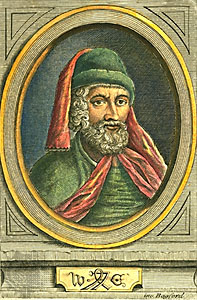
Back William Caxton AF وليم كاكستون Arabic وليم كاكستون ARZ ویلیام کاکستون AZB William Caxton BCL Уільям Кэкстан BE Уилям Какстън Bulgarian William Caxton Catalan William Caxton Czech William Caxton CY
William Caxton | |
|---|---|
 | |
| Born | c. 1422 |
| Died | c. (aged c. 68–69) |
| Resting place | St Margaret's, Westminster |
| Occupation |
|
| Period |
|
| Notable work | |

William Caxton (c. 1422 – c. 1491) was an English merchant, diplomat and writer. He is thought to be the first person to introduce a printing press into England in 1476, and as a printer to be the first English retailer of printed books.
His parentage and date of birth are not known for certain, but he may have been born between 1415 and 1424, perhaps in the Weald or wood land of Kent, perhaps in Hadlow or Tenterden. In 1438 he was apprenticed to Robert Large, a wealthy London silk mercer.
Shortly after Large's death, Caxton moved to Bruges, Belgium, a wealthy cultured city in which he was settled by 1450. Successful in business, he became governor of the Company of Merchant Adventurers of London; on his business travels, he observed the new printing industry in Cologne, which led him to start a printing press in Bruges in collaboration with Colard Mansion. When Margaret of York, sister of Edward IV, married the Duke of Burgundy, they moved to Bruges and befriended Caxton. Margaret encouraged Caxton to complete his translation of the Recuyell of the Historyes of Troye, a collection of stories associated with Homer's Iliad, which he did in 1471.
On his return to England, heavy demand for his translation prompted Caxton to set up a press at Westminster in 1476. Although the first book that he is known to have produced was an edition of Chaucer's The Canterbury Tales, he went on to publish chivalric romances, classical works and English and Roman histories and to edit many others. He was the first to translate Aesop's Fables in 1484. Caxton was not an adequate translator, and under pressure to publish as much as possible as quickly as possible, he sometimes simply transferred French words into English; but because of the success of his translations, he is credited with helping to promote the Chancery English that he used to the status of standard dialect throughout England.
In 2002, Caxton was named among the 100 Greatest Britons in a BBC poll.[1]
- ^ "Great Britons 11–100". BBC. Archived from the original on 4 December 2002. Retrieved 1 August 2012.